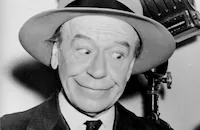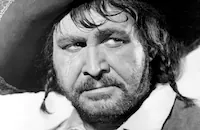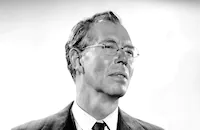Barnacle Bill

Brief Synopsis
Cast & Crew
Richard Thorpe
Wallace Beery
Marjorie Main
Leo Carrillo
Virginia Weidler
Donald Meek
Film Details
Technical Specs

Synopsis
Perpetually broke skipper Bill Johansen docks his small craft in San Pedro, agitating ship's store owner "Pop" Cavendish and his daughter Marge, who is fond of Bill, even though he has owed them money for years. Pop tries to have Bill's boat attached, but cannot because Bill has registered the boat in the name of his daughter Virginia, whom he has not seen since infancy. Meanwhile, refrigerator boat-owner John Kelly intimidates local fishermen into accepting only five cents a pound for tuna. Marge thinks Bill is just the man to fight Kelly, but Bill would rather fish for swordfish with his friend, Pico Rodriguez. On the same day that Bill loses his swordfish money to saloon girl Mamie, twelve-year-old Virginia, whose mother is dead, arrives from Gloucester, Massachusetts with her aunt, Letty Breckenridge. Virginia asks to stay with Bill, even though Letty thinks he is an unfit father. Bill likes Virginia, but doesn't want the responsibility of a child, so he convinces Marge to let her live on shore with her. Virginia and the kindhearted Marge then decide to start to "work" on Bill. On Sunday, Bill goes to church with them, but later shows up drunk for supper. Virginia then talks to Bill and tells him about the death of her maternal grandfather, a well-known Gloucester captain, and Bill decides to get a job. Bill and Pico sail on Joe Petillo's tuna boat, and a month later, Bill happily returns to find that Virginia and Marge have fixed his ramshackle boat. When Bill goes to collect his pay, however, he gets much less than expected and Petillo suspects that Kelly has been improperly weighing the catch. Bill then confronts Kelly's man Dixon, who offers Bill $150 to keep his "big mouth" shut. Bill is happy to take the money until Virginia proudly leads the other men to see his confrontation and Bill must refuse the money and fight Dixon to save face. Now a hero, Bill gets drunk in celebration and wakes up just before the sinking of his boat, which secretly had its seacocks opened by Kelly's men. As he and Pico are working to raise the boat, Virginia sees that their "dream" schooner is on the auction block and offers the highest bid at a fraction of the boat's actual worth. Bill uses his fishing money for a deposit and has ten days to pay off the $2,500 balance. Bill, who wants to sail with Pico to the South Seas, sweet-talks Marge into giving him the money by intimating that he might be interested in getting married. Although Bill almost loses the money to Mamie again, Marge jealousy fights her and throws him out of the saloon. The next day, Petillo and other fishermen suggest that they help finance Bill so that he can turn the schooner into a refrigerator boat. Bill pretends to love the idea, but secretly accepts bribe money from Kelly not to compete and has South Seas provisions delivered that night. When Virginia sees what is happening, she is disillusioned and calls Aunt Letty to take her home. When Marge finds out, she tells Bill, and he decides to go through with Petillo's idea. Pop, Pico and stowaway Marge then sail with Bill, who gives Kelly his money back. The voyage goes smoothly until one night, when Kelly and his men sneak aboard and open the seacocks to sink the boat. Bill's "crew" successfully fight Kelly and soon dock in San Pedro after successfully navigating a bad storm. Virginia is happily waiting and Bill and the suddenly bashful Marge marry.

Director

Richard Thorpe
Cast

Wallace Beery

Marjorie Main

Leo Carrillo

Virginia Weidler

Donald Meek

Barton Maclane

Connie Gilchrist

Sara Haden
William Edmunds
Don Terry
Alec Craig
Monte Montague

Irving Bacon
Harry Fleischmann
Harry Burns

Walter Baldwin
Milton Kibbee
Frank Yaconelli
Francis Pierlot
Harry Hayden
George Guhl
Harry Semels

Charles Lane
William Gould
Art Miles
Byron Shores
William Forrest
Dick Elliott
Gladden James
Alan Bridge

Roger Moore
Maria Genardi

James Millican
Edward S. Chandler
Crew
Milton Bren
Hugo Butler
Clyde De Vinna
Cedric Gibbons
Joe Goodwin
Frank E. Hull
Jack Jevne
Jack Jevne
Bronislau Kaper
Gilbert Kurland
Joseph Mccarthy
Urie Mccleary
George A. Minor
Al Piantadosi
Knowles Shaw
Douglas Shearer
Art Smith
Lou Strohm
Edwin B. Willis

Film Details
Technical Specs

Articles
Barnacle Bill
By Violet LeVoit

Barnacle Bill
Quotes
Trivia
Notes
The working title of this film was Lazybones. According to news items in Hollywood Reporter, this film was at one time intended as a vehicle for child actress Shirley Temple, who had recently left Twentieth Century-Fox and was put under contract to M-G-M. Temple was replaced by Virginia Weidler and did not make her M-G-M debut until November 1941, with the release of Kathleen (see below). A Hollywood Reporter news item on April 1, 1941 noted that actor Charles Ruggles was to appear in the film if he completed his role in Paramount's The Parson of Panamint on time (see below). Ruggles May have been intended for the role taken over by Donald Meek, "Pop" Cavendish.
News items also note that portions of the film were shot on location in San Pedro Harbor and Fish Harbor, in Southern California, as well as other, unnamed locations on the "lower California coast." According to a April 22, 1941 Hollywood Reporter news item, the Luckenbach freighter Stacy Day was used for three days while the crew was shooting in San Pedro Harbor. Wallace Beery and Marjorie Main recreated their roles for a Lux Radio Theatre broadcast on April 1, 1946. The program co-starred Beery's daughter Carole Ann in the role of "Virginia."















